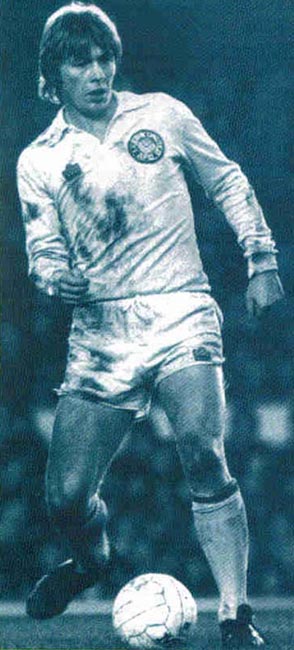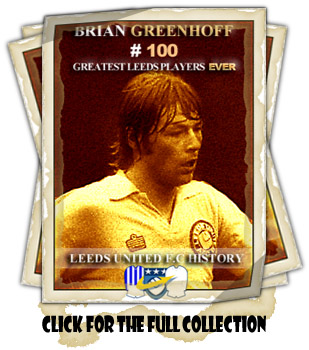

Greenhoff: Brian
1979-1982
(Player Details)
Full Back/Midfield
Born: Barnsley: 28-04-1953
Debut v Arsenal (h): 29-08-1979
5’10” 12st 2lb (1979)
#100 in 100 Greatest LUFC Players Ever

Brian Greenhoff was a ball-boy at Wembley when he saw his brother Jimmy win a 1968
League Cup Winners’ medal with Leeds. He later played in a Wembley Cup Final and trod the
Wembley turf as an England player. Their father had been a professional and Brian
represented Yorkshire as a schoolboy, and, while both brothers played for Manchester United,
it was the younger Brian who joined them six years before elder brother Jimmy, when he signed
for them in June 1970. Brian joined Manchester as an apprentice in August 1968, signing as a
professional in June 1970 and made his debut on 8th August 1973 in a 2-1 defeat at Portman
Road by Ipswich Town. In his first season, Greenhoff played in midfield along side Sammy
McIlroy but by 1977 Greenhoff had found his role in central defence, alongside Martin Buchan.
He was in the Manchester United team that got relegated at the end of the 1973-74 season and
lost the 1976 FA Cup final. However he won a Second Division Championship plaque in 1975. His
versatility made him an important member of the Old Trafford setup. He gained four
Under-Twenty-Three caps. He made his debut on 15th May 1974 in Zrenjanin, in a 1-0 loss to
Yugoslavia. This was follwed by a substitute appearance in place of Alan Hudson in a 2-2 draw
with France at Valence four days later. Hegot his name on the scoresheet with an eighty-eight
minute strike in a 3-1 win over Czechoslovakia in an European Championship Qualifier at
Selhurst Park on 29th October 1974, and he was captain in his fourth and final game, in the
European Championship Quarter-Final, Second Leg at Old Trafford on 23rd March 1976, when
England beat Hungary 3-1. He played for England "B" on 28th November 1978 against
Czechoslovakia in Prague, when England won 1-0 but was replaced by Bob Hazell in the second
half. He won his first England cap against Wales at Ninian Park, Cardiff on 8th May 1976 and
went on to play seventeen times while with Manchester United, playing the full game on twelve
occasions, coming on as a substitute twice and being substituted three times. He played in
two F.A. Cup Finals for Manchester United, gaining a winners’ medal in 1977 and was a
non-playing substitute in the 1979 Final. He amassed two hundred and twenty-one League
appearances at Old Trafford and scored thirteen goals. In addition he scored twice in
nineteen League Cup games, twice in twenty-four F.A. Cup ties, appeared in one Charity Shield,
four UEFA Cup ties and two European Cup-Winners Cup ties for a total of seventeen goals in two
hundred and seventy-one games, before he played his final game on 7th May 1979 in a 3-2 home
win over Wolverhampton Wanderers. In the late 1970s he had been an England regular and it
needed a £350,000 fee to take him to Leeds in August 1979. With Leeds he made one more England
appearance taking his total full caps to eighteen. He went a long way for two minutes play.
His final England game being against Australia at the Sydney Cricket Ground on 31st May 1980
in a 2-1 win for England when he came on as an eighty-eighth minute substitute for Alan
Armstrong. Unfortunately, his stay at Elland Road was disrupted by injuries and, after United
suffered relegation in 1982 his services were no longer required and he was allowed to leave
on a free transfer. He had only scored one goal while he was at Elland Road, but it was
fondly remembered by all who saw it as an absolute beauty. A screaming shot into the top right
hand corner from the edge of the penalty area on 13th December 1980 to give United both points
in a First Division game against Nottingham Forest at Elland Road, leaving Peter Shilton
grasping at thin air. He joined South African side, Wits University, but was soon on the move
to Bulova SA in Hong Kong where he stayed for some of the 1982-83 season, before scoring once
in ten appearances for Finnish team Rovaniemen Palloseura (RoPs) in 1983. He then returned to
England, where he joined brother Jimmy at Rochdale in December 1983, as Player-Coach, after
his brother had been appointed Player-Manager earlier in 1983. He playing sixteen games
before retiring in 1984 to run a shop in that town after Jimmy was sacked in March 1984. He
helped Chadderton FC and was a sales representative for a sports goods wholesaler. The firm
he worked for, William Lindop Ltd in Manchester, supplied sports equipment to shops from Hull
to Blackpool and Newcastle to Carlisle. Brian was often on the road visiting shops across the
north of England. He later worked in Menorca, Spain, mostly as a waiter, but returned to
England due to an illness in the family. He died 22nd May 2013 aged sixty